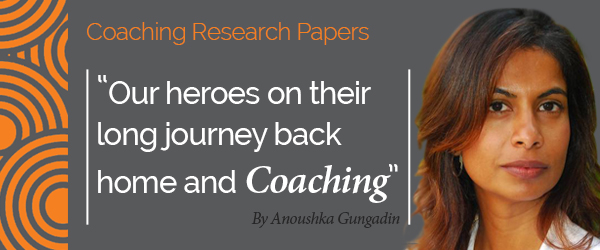Research Paper By Anoushka Gungadin
(Global Leadership, AUSTRALIA)
Acknowledgements
I am taking a moment here to share the inspiration behind this paper which is so strong, it is almost palpable. I had fixed a personal deadline of 30th September for my research paper and I was well prepared to write a paper about global leadership and cross cultural coaching, two areas of interest to me. However I had been putting off starting it. Intuition told me there must be a reason for it so I stayed open to that, knowing very well that I will hand in my paper within the ICA deadline in any case.
On the morning of the 24th Sept 2012, as I was enjoying my morning cup of tea, listening to the radio I heard the end an of interview of Major General Cantwell on the release of his book ‘Exit Wounds: One Australian’s War on Terror’, which was followed by an invitation to the public to share their views and stories. I heard the testimonies of two war veterans about how hard their return home has been, the nightmares, the inability to drive after 6 years or start working and having to deal with being judged. I acknowledge both soldiers for their authenticity and courage. I also have a special thought for the servicewoman who ‘bravely shared her constant struggle and ended up in tears as her pain is so real- more real than the pain were her feelings of I perceived as ‘broken dreams’.
My first thoughts were:
What can we do? What can I do? These warriors are putting their lives,dreams, loves and even their future at risk to protect my freedom, yes my freedom and that of my children and they are suffering so much. How can I give back? How can coaching support our heroes bounce back? I was very moved by the words and experiences of these 2 veterans. After 2 days of non-stop thinking about it, I decided to change my research paper completely and take a dip in an area I knew nothing about. I followed my heart’s calling rather than my head’s logic, trusting that the outcome, will be one of growth. I have indeed learnt a lot and I am very happy to share my findings with you here.
Happiness for our heroes on their long journey back home and coaching
Introduction
Warriors truly want to feel normal, they want to be like they were and what you would like them to be again, but that is impossible; they have changed forever. Help them to help themselves by understanding what they have been through, what horrors they have experienced and how they long to be loved and accepted for who they’ve now become. from The Warrior’s Guide to Insanity, Sgt. Andy Brandi, U.S.M.C.
Going to war is very difficult for any soldier, and perhaps equally as difficult is returning home and transitioning back to a normal life. The scars, both physical and emotional, leave our soldiers changed forever. It is very normal to get treatment for the physical wounds and this is in no way regarded as a sign of weakness. Unfortunately, the same does not hold true for the invisible emotional and mental wounds. They can show up in the lives of the soldiers and not affect only them but their families as well. The most known example of suffering after the war or combat is post-traumatic stress disorder (PTSD). PTSD is classified as an anxiety disorder developed after exposure to traumatic events, including war and combat.
Left untreated, PTSD can impair the relationships of the soldiers with their families as well as their interaction with society. While soldiers are at high risk to be affected by PTSD, they often do not seek treatment. This research paper reviews briefly findings about the effects of war on soldiers, namely PTSD. It then continues to make the case for coaching as a relevant and powerful tool to support soldiers before, during and after deployment.
For generations, our heroes have been selflessly defending our countries, our beliefs, our freedom, our ways of life and our future generations. They have just completed war in Iraq and still fighting in Afghanistan. These have resulted in prolonged periods of stress, providing very little rest in between redeployments. Our soldiers have been faced with constant uncertainty for over a decade; uncertainty over deployment, over their next mission and even over going back home. Due to extended exposure to war, Army and Marines members are generally believed to be at higher risk of PTSD
Schnurr, Lunney and Sengupta identified risk factors for the development of PTSD in Vietnam veterans, with an estimated 830 000 sufferers. In 2011, a study from Georgia State University and San Diego University found the PTSD was significantly increased when troops were deployed for longer than a year, experienced combat and suffered injuries. The total estimated two year costs of treatment for PTSD for the 2.16 million US troops deployed between 2001 and 2010 are between $1.54 and $ 2.69 billion. Left untreated, PTSD affects our soldiers’ behaviour and all aspects of their lives including love, family and social PTSD is as old as war itself, although its recognition only happened in modern warfare. Even though the armies of the countries engaged in these two wars are offered mental health care support, due to the army culture, soldiers are hesitant to seek treatment, as they fear intolerance, stigmatisation and even jobloss
This is despite evidence proving that treatments can actually improve psychosocial functioning and reduce severity of psychiatric and stress-related symptoms.
